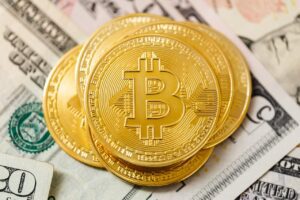Cryptocurrencies are all the rage these days. You’re probably familiar with Bitcoin, but guess what? There are other, exciting cryptocurrencies out there too, like Ripple.
What is Ripple?
Ripple (XRP) is one of the largest cryptocurrencies in the world. It’s not just a virtual coin, though. It’s also a powerful payment network used by a number of financial institutions.
If you’re looking to invest in cryptocurrency, then you should learn more about Ripple and how it’s increasing blockchain adoption. Here’s everything you need to know.
The Rise of Cryptocurrencies
There’s no doubt that ‘cryptocurrency’ has been a buzzword for a long time now. Most of us are aware that cryptocurrencies exist and that you can make money by investing in them. But beyond that, people are often clueless.
So what is cryptocurrency? Simply put, it’s an internet-based currency that leverages blockchain technology and cryptographical functions to process transactions.
An important aspect of cryptocurrency is that it’s decentralized, allowing for transactions to take place without a third party. The concept first emerged in the early 2000s with the creation of Bitcoin.
After Bitcoin’s thriving success, more and more cryptocurrencies began to emerge. In fact, nowadays there are hundreds of different virtual coins.
The rapid evolution of cryptocurrency and blockchain technology is exciting but it can also be confusing. After all, how are you supposed to know which coin to buy?
The third-largest cryptocurrency by market capitalization is Ripple, also called XRP. It’s a new and exciting blockchain platform and cryptocurrency that promises good investment opportunities.
What Is Ripple?
Ripple comprises a payment network called RippleNet and a cryptocurrency called XRP. Founded in 2012, Ripple connects financial institutions and allows them to transact over its network.
The RippleNet platform is capable of processing 1,500 transactions per second. This is much faster than either Bitcoin or Ethereum.
All transactions passing through the Ripple network are recorded on a decentralized ledger. RippleNet reduces the time and money it takes to process cross-border payments. And XRP is the currency that’s used in the payment platform.
Another advantage of Ripple is that’s it’s scalable. While many have expressed concerns over Bitcoin’s scalability, Ripple can process hundreds of transactions a second.
Ripple (XRP) vs Bitcoin
The main difference between Ripple and Bitcoin is that Ripple is a payment platform that aims to replace systems like SWIFT. Financial institutions and other organizations use Ripple to process transactions.
Ripple’s cryptocurrency XRP can be traded but it was not meant to become a payment method for making purchases online.
Bitcoin, on the other hand, is a cryptocurrency that was meant to become a global currency. The aim of Bitcoin was to replace conventional money as a way of buying goods and services through the internet.
Many people like Bitcoin because it’s a way of making payments while bypassing banks and other third-party financial institutions. Bitcoin is also totally decentralized, meaning there’s no central authority that distributes coins.
Unlike Bitcoin, Ripple is working directly with banks and other organizations to help them speed up transaction times and reduce fees. Many cryptocurrency enthusiasts criticize Ripple for this.
Furthermore, Ripple is not a fully decentralized currency. In fact, the company created all of the XRP coins before they launched and they still hold more than half of the supply.
Ripple and Banking
The traditional idea behind cryptocurrency was to replace the need for banks and financial corporations. Why? To usher in a new financial system devoid of corruption or control.
This is was Bitcoin aimed to do and other currencies followed. Ripple, however, went another route. They decided to build a blockchain payment network that could be utilized by banks to improve their cross-border transaction processes.
Blockchain technology holds many benefits for a variety of companies and industries, and Ripple knows this.
Bitcoin and Ethereum, the two biggest cryptocurrencies by market cap are completely decentralized. No single authority has control over the network. Instead, it is dependant on millions of miners all over the world.
In contrast, Ripple Labs, along with their various partner institutions, manage the RippleNet payment network. And the nodes of the network validate transactions without providing proof-of-work calculations. This is similar to the way traditional banks operate.
Should You Invest in Ripple?
As the adoption of the Ripple platform continues to increase, the value of XRP is likely to keep going up. In fact, it’s been on a constant uptrend ever since it launched back in 2012.
Ripple’s connection with banks is what turns a lot of people away, but this can also be seen as an opportunity. In our current system, it takes 3-5 days for payments between banks to be settled. Ripple could revolutionize the way we transact by speeding up these slow processes.
Although Ripple’s XRP is the third biggest cryptocurrency by market cap, its price is much lower than both Bitcoin and Ethereum. The price of XRP is currently around $0.61 and many experts predict it will continue to grow.
While some coins suffered during March, the Ripple cryptocurrency, XRP, has held relatively stable this year. So, if you’re looking for an affordable cryptocurrency to invest in, Ripple is a good choice.
Because crypto coins have to be stored in a digital wallet, you’ll need to get one before you can buy Ripple.
Is Ripple the Future of Cryptocurrency?
So, what is Ripple? It’s a blockchain payment network aiming to disrupt and replace current financial systems.
Thanks to partnerships with large financial institutions like Moneygram and American Express, Ripple is gaining recognition and increasing blockchain adoption.
With features like fast transactions, low fees, and powerful connections, Ripple has gained popularity in the cryptocurrency space. It’s low price also makes it an attractive investment for those on a tight budget.
Should you invest in Ripple? That’s your choice to make. If you found this blog post helpful, check out more content in the finance section of our blog.









